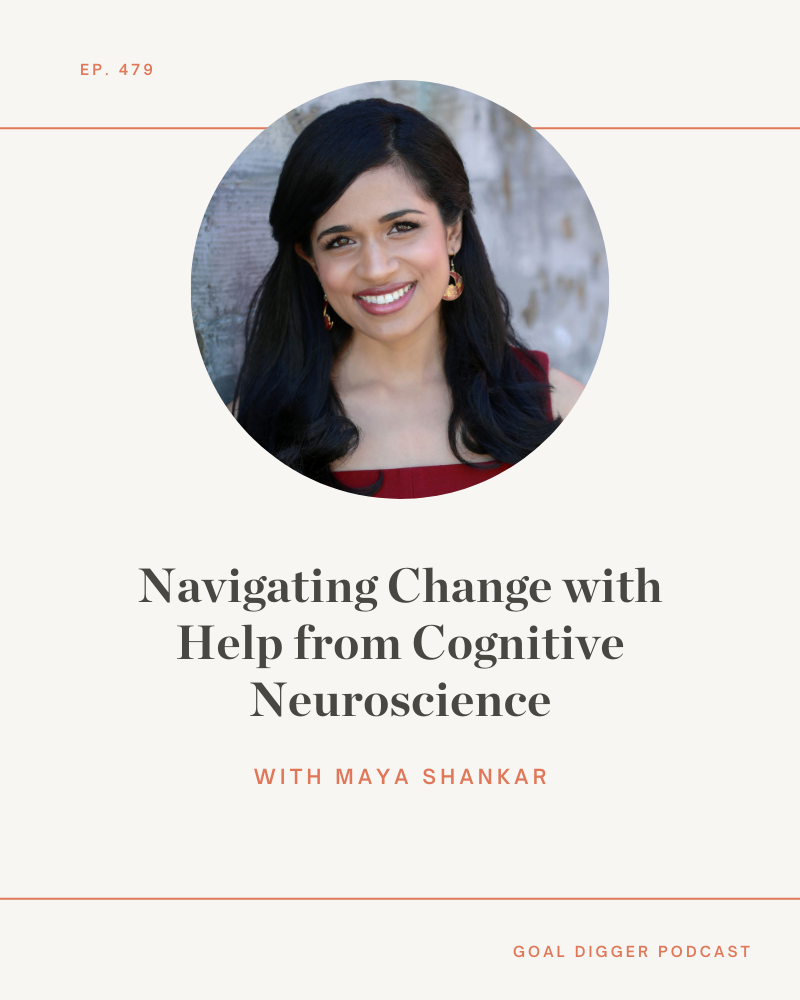
Apple Podcasts | Spotify | Stitcher
She was well on her way to a career as a classical violinist, studying under a prestigious mentor at Juilliard School, when a career-ending injury changed the course of Maya Shankar’s future. It was an incredible loss — her passion and identity as a classical violinist crumbled. But that major change led to an entirely different career, one that centers on the very thing she struggled with — change.
Dr. Maya Shankar is a cognitive scientist who studies how our minds work and how we change. Her career milestones are nothing short of impressive — from convincing the White House to create a job for her to her work in human behavior and decision-making at Yale, Oxford and Stanford. And she recently launched her own podcast called, A Slight Change of Plans.
Dr. Shankar is on Goal Digger to explore the sometimes stress-inducing topic of change. When confronted with a major life or career change, how do we manage and thrive? Are humans today more or less change averse? And if you think you’re “bad with change”, what can you do about it?
Identity Foreclosure
When Maya’s very early violin career ended with an injury, she became despondent. She’d always categorized and identified herself as a violinist and suddenly, without warning, her identity was shattered. What she knows now is that she was experiencing what cognitive science calls identity foreclosure.
“It refers to the fact that we can commit ourselves to an identity, a very specific identity, without having explored all the other options out there and it can lead us to feel really fixed in that identity,” Maya explained. “This kind of bias can exist in adolescents because it can also persist into adulthood, and it can emerge in response to just feeling really anxious about uncertainty or change.”
As she explored where her life would go if it wasn’t into becoming a professional violinist, Maya had her first big a-ha moment when she found a book about cognitive science in her parent’s basement. She credits that book for introducing her to the field, and she went on to study it in college, earning her PhD and post-doc in cognitive neuroscience. She’s been a practitioner in the field ever since.
Sunk Cost Fallacy
Maya spent the early parts of her post-doc career working in a windowless lab, and though she enjoyed her line of study and the field she put so much time into learning, she realized that the version of it she found herself in was not the version she wanted. So, with the help of a few mentors to help her discern the next step, Maya pitched herself to the White House to create a job that would perfectly align with where she wanted to go — the intersection of behavioral science and policy.
She explained, though, that even when the Obama administration created a job especially for her, there was some quiet lingering fears about pivoting into a new path. Maya explained, “tThere’s this insight in cognitive science called the sunk cost fallacy, and it does lead us to irrationally cling to things that we put a lot of time and effort into because we don’t want to experience the costs of departing.”
Maya continued, “I will say, one lesson I learned from this experience is when you are venturing potentially into a new space, and you’re trying to use the resources that are within your community, the opportunity might not exist. What I’ve learned from this White House position is that sometimes you can create it for yourself. If the job doesn’t exist, try to get the job to exist.”
Affective Forecasting
Affective forecasting is another piece of cognitive and behavioral science, which essentially refers to our own ability to forecast or predict how we will respond to events in the future. “What research shows is that our predictions are often very unreliable,” Maya explained. “We reliably misjudge what will make us happy and we tend to overestimate just how positive or negative we will feel about future situations.”
In our conversation, Maya shared an example of affective forecasting and how a guest on her podcast, “A Slight Change of Plans”, a man who was once the image of perfect health and wellness received a stage four cancer diagnosis. The change in his life, from losing a leg to challenges with recovery, was dramatic… But he couldn’t have anticipated the good changes that came from it, too. Press play on this episode to hear more about affective forecasting and why it’s important to understand.
I asked Maya if she thought humans should be sooner to let go in the face of the unknown, because we so often poorly predict our own response to something. Maya said, “Our expectations are informed by our current understanding of who we are based on all the data points we’ve collected about ourselves over time. But that is an incomplete model of who we are. Sometimes it really takes a true test to really figure out your true potential and also the various interesting ways in which you might respond to a specific episode.”
More from this Episode
If learning about your brain and how it works is exciting to you, you need to hit play on this full conversation with Maya Shankar. You can learn more about change on her podcast “A Slight Change of Plans”, available wherever you listen to the Goal Digger Podcast.





[…] Cognitive neuroscientist, Dr. Maya Shankar defines identification foreclosures as, “… [committing] ourselves to an identification, a […]